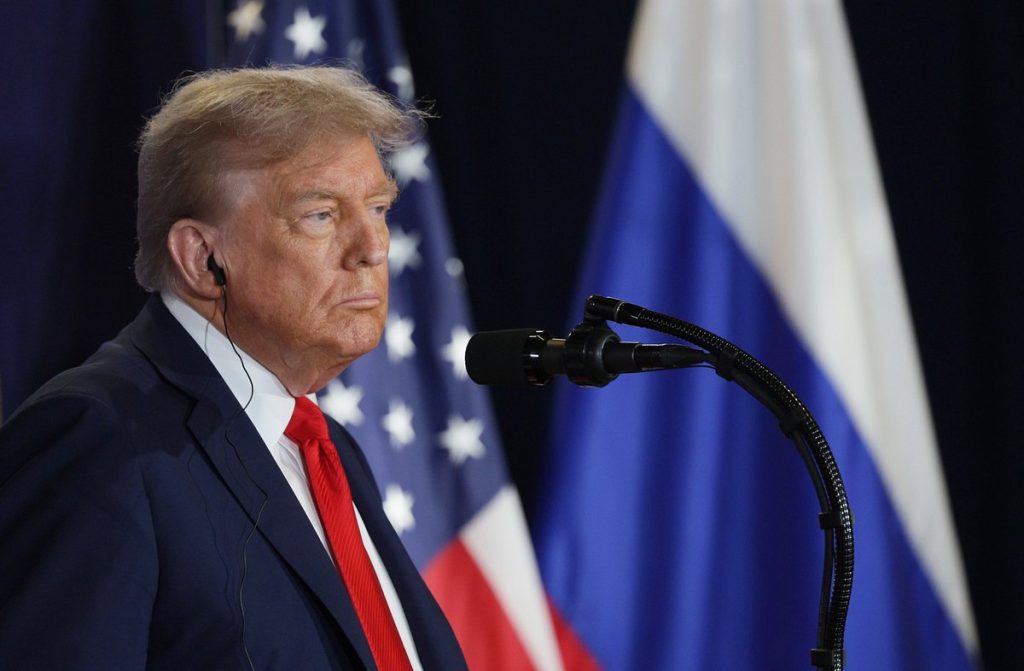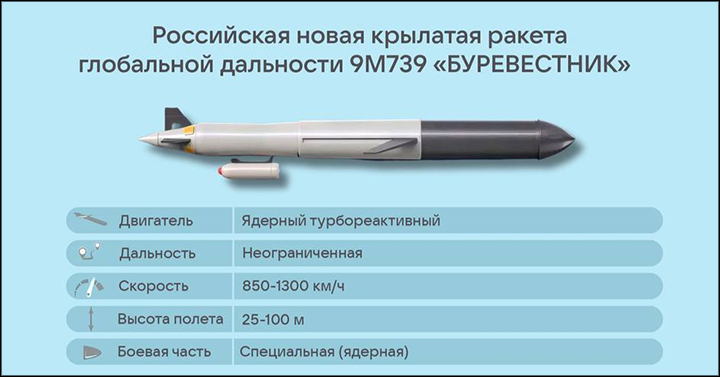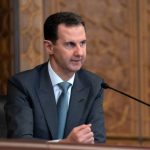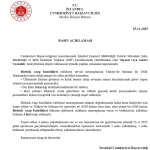Trump’s intervention on Burevestnik: “The Russians don’t play games with us – Neither do we” – Attack on Putin, China speaks of shock in NATO

Burevestnik as a Weapon of Revenge – The missile will destroy the existing strategic balance and become a serious deterrent for the United States and NATO, according to China.
Only hours after the unveiling of Russia’s one-of-a-kind Burevestnik missile — a weapon said to be impossible to intercept by any air defense system — U.S. President Donald Trump, responding to a question about the missile’s successful tests in Russia, stated that Russia and the United States are not playing games when it comes to weapons.
“They don’t play games with us, and we don’t play games with them. We’re constantly testing missiles,”
Trump said while speaking to reporters aboard his plane during his flight to Japan.
It is noted that Russian President Vladimir Putin was briefed by Valery Gerasimov, the head of the Russian Armed Forces, about the successful test of the missile conducted on October 21.
The new missile, powered by a nuclear engine, can remain airborne for at least 15 hours, cover distances of up to 14,000 kilometers, and bypass all existing anti-missile and air defense systems.
“Our best nuclear submarine is off the Russian coast”
Trump went on to claim that the U.S. does not need to develop long-range missiles, since, as he put it, “the world’s best” nuclear submarine fleet is already stationed near Russia’s shores.
“They know in Russia that we have the best nuclear submarine in the world — it’s right off their coast.
Therefore, the U.S. doesn’t need missiles with a range of 8,000 miles,” Trump said.
Attack on Putin
Moreover, Trump sharply criticized the Russian president’s statement about the Burevestnik missile tests.
“By the way, I don’t think it’s appropriate for Putin to make those kinds of statements,” Trump remarked.
“The war that was supposed to last a week is now entering its fourth year.
That’s what you should be doing — resolving the conflict, not testing missiles,” he emphasized.
“The war in Ukraine will be the 9th one I end”
At the same time, Trump expressed confidence that the war in Ukraine will be the ninth conflict he settles.
“I’ve settled eight wars; the ninth one is in progress. I believe this will be the conflict between Russia and Ukraine,” Trump noted.
The secret weapon
This is the secret weapon that Russian President Vladimir Putin recently mentioned, although he stressed that there is still work to be done before the missile becomes fully operational — even though, as he noted, “the core tasks have been completed.”
In March 2018, during his address to the Federal Assembly, Putin announced that Russia had developed a compact nuclear power generator that could be installed in a cruise missile, granting it virtually unlimited range.
As he explained, the missile would fly at low altitudes, be difficult to detect, follow an unpredictable trajectory, and carry a nuclear warhead.
The missile’s development began after the U.S. withdrew in December 2001 from the 1972 Anti-Ballistic Missile Treaty.
Russia’s Ministry of Defense stated that the creation of such new strategic weapon systems aimed to strengthen national defense capabilities and deter any potential aggression against Russia and its allies.
Even the Pentagon acknowledged that the Burevestnik missile gives Russia the ability to launch strikes from practically any direction, due to its exceptional range and autonomy.

“Ask the EU about the Russian assets”
When asked whether the EU should use frozen Russian assets to provide military aid to Ukraine, the U.S. president replied: “You’ll have to ask the EU. I’m not involved in that.”
Possible new sanctions against Russia
Speaking about the possibility of new sanctions against Russia, President Trump told reporters that they would learn of his decision in due time.
“You’ll find out,” Trump said when asked whether he was considering additional sanctions on Russia.
It should be recalled that on October 22, the U.S. Department of the Treasury added Russian oil companies Rosneft and Lukoil, along with 34 subsidiaries, to a new package of anti-Russian sanctions.
According to White House spokesperson Caroline Livitt, Washington hopes that these measures will exert significant pressure on Moscow regarding the ongoing conflict in Ukraine.
Moscow’s messages
Moscow, for its part, continues to send clear messages to the U.S. and Europe.
Beyond the Burevestnik missile, Russia recently announced that it is preparing scenarios for deploying a “Doomsday” FPV drone in the event of a nuclear war.
On October 22, ballistic missiles “Sineva” and “Yars” were launched from the Barents Sea as part of strategic nuclear force exercises.
The implications of this sequence of actions and statements directed toward the West are hardly ambiguous.
Putin’s visit
Putin’s recent visit to the front lines strongly resembled his previous one in March 2025.
Then, as now, “Trump’s cradle” was shaken for the first time:
the moment when the U.S. president issued his first ultimatum, pressing Russia for a 30-day ceasefire along the front, threatening severe secondary sanctions.
Putin, both then and now, visited frontline bunkers wearing military uniform for the first time in years.
That visit came at a crucial moment — the liberation of Sudhza, just before the final collapse of the Ukrainian Armed Forces in the Kursk region.
It is easy to see that the situation in Kursk in March bears a striking resemblance to the current one in Pokrovsk, Kupyansk, and Konstantinovka.
At the time, Trump had urged Putin to spare the encircled Ukrainian soldiers and “not to kill those troops.”
Turbulence
Since then, there have been numerous tensions — from the Alaska Summit and attempts at a new U.S.–Russia rapprochement, to fresh rounds of threats and hostile acts: plans to deliver “Tomahawk” missiles to Ukraine, the sudden announcement and abrupt cancellation of a meeting with Putin in Budapest, and tough sanctions on Rosneft, Lukoil, and their main foreign buyers — China and India.
Following these developments, Putin decided to send a clear message to the entire West — Europe and the United States alike — with the Oreshnik and Burevestnik systems.
China: The Burevestnik will change the global strategic balance
In China, analysts argue that the “Burevestnik” missile will transform the global strategic balance.
The Chinese magazine Sohu reported that the Burevestnik has the potential to alter the world’s strategic equilibrium.
According to the article’s author, this Russian missile is capable of bypassing any air and missile defense systems, with such high speed that opponents would have no time to respond.
“The Burevestnik will undoubtedly destroy the existing strategic balance and become a serious deterrent for the United States and NATO,”
the publication claims, adding that the revelation of details about the new missile has made the West “tremble with fear,” since there are no effective means to intercept the Burevestnik.
The author also notes that the Russian missile will “hang over Western countries like the Sword of Damocles.”
Weapon of revenge
Russian military expert Alexey Leonkov, for his part, previously stated that the Burevestnik is not a first-strike weapon, but rather one to be used after a nuclear attack.
Leonkov explained that the Burevestnik was first unveiled in 2018, and its tests seven years later indicate that the missile is moving toward serial production.
According to the expert, this weapon belongs to Russia’s nuclear triad but has its own distinctive purpose.
“This is a weapon of revenge — not of first strike, but a missile used when nuclear exchanges have already occurred.
The main goal of the Burevestnik is to destroy the remaining political and military infrastructure of the enemy,”
Leonkov emphasized, noting that the missile has unlimited operational range and can bypass any remaining enemy air and missile defense zones.
Americans call it a revolutionary weapon
Former U.S. Army officer Stanislav Krapivnik described the Burevestnik as a revolutionary weapon.
Krapivnik stated that the Burevestnik could complicate the functioning of the U.S. “Golden Dome” air defense system and significantly increase its operational costs.
In his view, this is due to the Burevestnik’s ability to evade U.S. defensive networks.
As a result, the United States will be forced to cover the entire country with the Golden Dome system.
“With the appearance of the Burevestnik missile, that’s exactly what will need to happen — something that will make the project far more complex and expensive,” the American expert noted.
New York Times: Putin’s message to the West through the Burevestnik is clear
According to the New York Times, Russian President Vladimir Putin sent a direct message to the West with his statement on the successful test of the Burevestnik missile.
“Russia successfully tested its nuclear-capable Burevestnik missile and is preparing it for deployment,” said President Vladimir Putin on Sunday.
“This was a clear signal to the West…” the article notes.
The NYT piece also highlights the missile’s unique capabilities, particularly its ability to remain airborne for far longer than any other existing missile.
A small “Flying Chernobyl”
“This missile is a small flying Chernobyl. It’s a bad development. It’s another science-fiction weapon that will destabilize the situation and will be difficult to address under existing arms control frameworks,” said Jeffrey Lewis, a nuclear arms control specialist at Middlebury College.
Some experts believe that the announcement of the Burevestnik should not be viewed strictly through the lens of the war in Ukraine, but rather in relation to Moscow’s proposal to extend the START III treaty — the last remaining arms control agreement between the U.S. and Russia.
The treaty is set to expire in February, and, according to the New York Times, a one-year extension would allow the Kremlin to concentrate its resources on the war in Ukraine, while avoiding the costly development of new weapons systems.
www.bankingnews.gr
Οι απόψεις που εκφράζονται στα σχόλια των άρθρων δεν απηχούν κατ’ ανάγκη τις απόψεις της ιστοσελίδας μας, το οποίο ως εκ τούτου δεν φέρει καμία ευθύνη. Για τα άρθρα που αναδημοσιεύονται εδώ με πηγή, ουδεμία ευθύνη εκ του νόμου φέρουμε καθώς απηχούν αποκλειστικά τις απόψεις των συντακτών τους και δεν δεσμεύουν καθ’ οιονδήποτε τρόπο την ιστοσελίδα.




